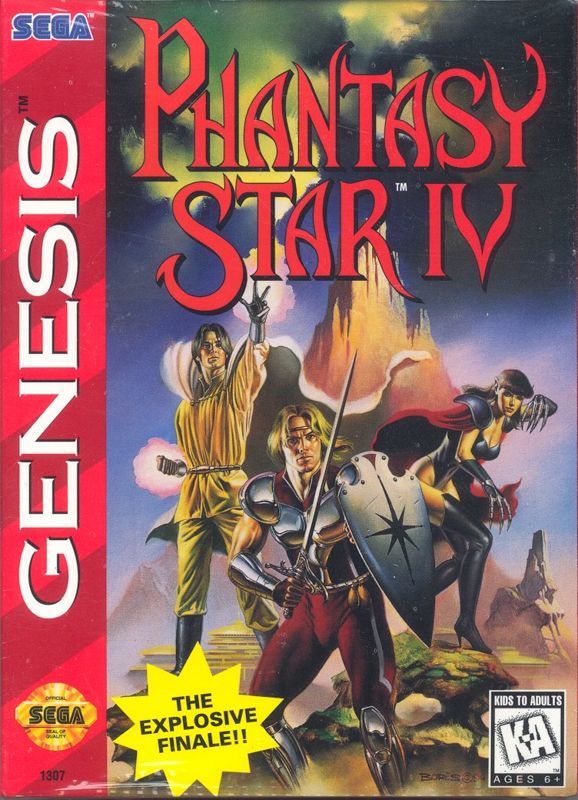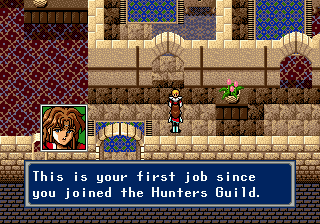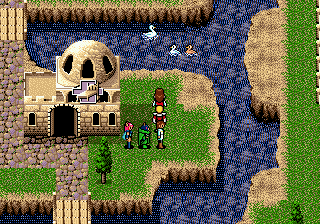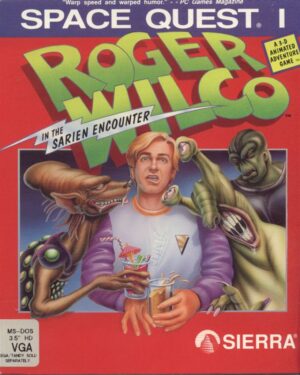Retro Replay Review
Gameplay
Phantasy Star IV builds on the classic Japanese-style role-playing conventions established in earlier entries, offering a top-down world map that invites thorough exploration. Random encounters keep players on their toes, while turn-based combat emphasizes strategic planning over button-mashing. The ability to equip two weapons simultaneously and execute combination attacks between characters adds layers of tactical depth, encouraging experimentation with different party compositions and skill synergies.
(HEY YOU!! We hope you enjoy! We try not to run ads. So basically, this is a very expensive hobby running this site. Please consider joining us for updates, forums, and more. Network w/ us to make some cash or friends while retro gaming, and you can win some free retro games for posting. Okay, carry on 👍)
Leveling and technique learning are streamlined, allowing you to focus on the journey rather than micromanagement. Android characters introduce unique challenges—they cannot be healed by conventional means and instead rely on rare items found in dungeons. This mechanic keeps players mindful of resources and highlights the narrative distinction between organic and artificial life forms in the Algol system.
Beyond standard battles, Phantasy Star IV sprinkles in vehicle combat segments that follow the same turn-based rules, providing a fresh change of pace without overcomplicating the core combat loop. Side quests in the form of Hunter’s Guild assignments give the game additional structure and reward completionists with extra story beats and gear. Finally, the “party talk” feature—complete with manga‐style comic panels—offers character interactions that deepen relationships and flesh out motivations, making every quest feel more personal.
Graphics
On the Super Nintendo hardware, Phantasy Star IV stands out as a visual showcase of the 16-bit era’s capabilities. Character sprites are expressive and richly detailed, conveying emotion even without voice acting. Battle animations for techniques and special attacks burst with color and fluidity, giving each combat encounter a cinematic flair that was rare for its time.
The world map and dungeon environments strike a balance between practicality and artistry. Motavia’s deserts ripple in subtle hues of ochre, while the icy expanses of Dezolis glimmer in cool blues, immersing players in the varied climates of the Algol star system. Despite hardware limitations, terrain textures and background elements create a convincing sense of place, from the ruins of Palma to the bustling corridors of the Hunter’s Guild.
One of the most striking visual features is the use of manga-style cutscenes to advance the plot. These comic book panels are hand‐drawn with dramatic shading and dynamic layouts, breaking up exploration with story moments that feel both nostalgic and engaging. This blend of in-game pixel art and illustrative interludes elevates the narrative delivery without relying on full-motion video or voiceover.
Story
The narrative thrust of Phantasy Star IV begins with a familiar premise: the Algol star system once thrived in harmony, until the explosion of Palma devastated civilization. As Motavia gradually recovers a millennium later, a malevolent force known simply as “the Darkness” resurfaces. Young hunter Chaz Ashley’s routine assignment spirals into an epic quest that binds him to allies across disparate worlds, each carrying their own history and stakes.
Character development is at the heart of Phantasy Star IV’s storytelling. Alys Brangwin emerges as a mentor figure with hidden depths, while the enigmatic android Aika wrestles with the boundaries between programmed purpose and genuine emotion. Their interactions through “party talk” segments add nuance to the main plot, revealing personal weaknesses and forging bonds that make climactic events feel earned.
Despite the absence of voice acting, the game’s script strikes a deft balance between humor and pathos. Moments of levity—such as lighthearted banter between party members—contrast effectively with darker revelations about the nature of the Darkness. Pacing is handled with care, allowing exploration and side content to breathe without derailing the central storyline. For fans of classic JRPGs, this measured approach delivers both scope and intimacy.
Overall Experience
Phantasy Star IV remains a standout example of 16-bit RPG design, marrying deep mechanics with an emotionally resonant tale. The marriage of varied combat options, thoughtful resource management, and side quests ensures that the adventure never grows monotonous. Even veteran players will find newfound appreciation in revisiting the game’s intricacies, from perfecting tech combinations to unearthing hidden treasure chests for android upgrades.
Visually and thematically, the game strikes an impressive balance between technical prowess and artistic expression. The layered environments, animated sequences, and comic panel cutscenes form a cohesive aesthetic that has aged remarkably well. While modern remasters may offer quality-of-life enhancements, the original SNES version’s charm and performance hold up as a testament to its design strengths.
For anyone seeking a blend of strategic combat, rich storytelling, and classic JRPG atmosphere, Phantasy Star IV delivers in spades. Whether you’re discovering the mysteries of Algol for the first time or revisiting its desert wastelands and icy peaks, this game offers an engaging experience that stands the test of time. It’s a must-play for genre enthusiasts and a rewarding journey for all who heed the call of the Darkness.
 Retro Replay Retro Replay gaming reviews, news, emulation, geek stuff and more!
Retro Replay Retro Replay gaming reviews, news, emulation, geek stuff and more!









Reviews
There are no reviews yet.